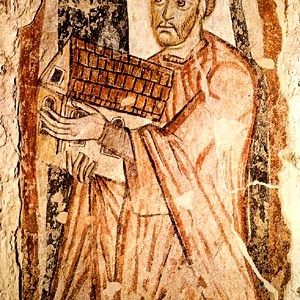Our Sunday readings sum up in one word what people like us, who are waiting for the Lord’s return, should do while we wait: Prepare!
Gospel (Read Lk 3:1-6)
St. Luke carefully sets the historical stage for the momentous event he wants to describe. See how concrete both the civil and religious details are in this description. Promises God had made to his people through the prophets centuries earlier were beginning to be fulfilled, in real time and space. We immediately recognize that what is about to unfold is no fairy tale. Within history, “the word of God came to John, the son of Zechariah, in the desert.” When Jesus, the Son of God, keeps His promise and returns to this world for which He died, it will also be within history, although it will be the last event of our history, bringing time (and thus history) to an end.
John’s was to be a work of preparation for Jesus’ first Advent. How do people prepare to meet their God? They face their sins and repent of them. John baptized those who heeded his message; they were aware of their unworthiness to have an encounter with the Lord. They underwent a “washing” of baptism as a sign that they wanted to be done with their sins. St. Luke uses a quotation from Isaiah (see Isa 40:3-5) to show us that not only was Jesus’ arrival foretold by the prophets but also the appearance of one who came to prepare for Him, an indication of the importance of this preparation. Isaiah describes the work poetically; it entails making straight paths, filling in valleys, leveling mountains, etc. The imagery comes from the actual road work done in ancient times to prepare for the arrival of a king who traveled to visit a city not his own. His coach and entourage needed straight, level roads for easy passage. His access to a city could be delayed or diverted if the roads were in poor condition.
This imagery is used by Isaiah to describe the spiritual preparation necessary for the coming of God. Sins of omission (“valleys”) and sins of commission (“mountains”) need to be made level by repentance. The Lord desires access to the hearts of His people. “Winding roads” that give Him only occasional, indirect approach need to be “made straight.” “Rough ways” full of obstacles need to be “made smooth.” This is the work of preparation to which John the Baptist called God’s people as the time of “the salvation of God” drew near. It is also our work in Advent, a season for our own preparation as we await the coming of Jesus. The Lord may, indeed, come again this year to end this age and begin the life of the world to come. We do not know the day or the hour. We do know that Jesus has called us to readiness for this, whenever it may happen. We also know that even before that Final Coming, He is always coming to His people in this world—in the sacraments, in the poor, in worship. To live in a perpetual state of preparation is a blessing to us. That is why Jesus said, “Blessed are the pure of heart, for they shall see God” (see Mt 5:8).
Advent is the penitential yet joyful season in which we are reminded of our need for preparation, but it’s not the preparation that can keep us busy with decorating our homes, shopping for gifts, and planning meals. We pause to check the road the Lord wants to travel into our hearts in this coming year—is it straight and smooth? If not, the confessional is a great place for the “road work” of Advent to begin.
Possible response: Lord Jesus, I can see I have “road work” to do this Advent. I have many “winding roads” that need to be made straight for You. Please help me.
First Reading (Bar 5:1-9)
During Israel’s Babylonian exile, the prophet, Baruch, preached God’s promise to restore the fallen city of Jerusalem, the place that once housed the Temple, the treasure of all His people. He poetically describes the city as in “mourning and misery” because her people had been punished for their covenant unfaithfulness. The punishment would not last forever. One day, God would lead His chastened, repentant people back to rebuild their great city. How would the people advance into the city? “For God has commanded that every lofty mountain be made low, and that the age-old depths and gorges be filled to level ground, that Israel may advance secure in the glory of God.” Again, we find the theme of “road work” before God and man meet. The people who had endured the exile were ready to embrace their covenant with God—to love Him with all their strength and their neighbors as themselves. As a result, their return would be a time when God would lead “Israel in joy, by the light of His glory, with His mercy and justice for company.”
Possible response: Heavenly Father, thank You for Your promise to accompany us with “mercy and justice” in our pilgrim journey here.
Psalm (Read Ps 126:1-6)
The psalm gives us a beautiful description of people who have experienced great deliverance at God’s hand. It was originally written to express the joy of Israel’s return to Jerusalem from exile: “When the LORD brought back the captives of Zion, we were like men dreaming. Then our mouth was filled with laughter, and our tongue with rejoicing.” For us now, people of the New Covenant, the psalm helps us anticipate the return of Jesus to establish, visibly, His eternal kingdom, where every tear will be wiped away. As we wait, we are often like “those who go forth weeping, carrying the seed to be sown.” We know what it is to mourn, to hunger and thirst for righteousness, to be poor in spirit, to be persecuted for righteousness sake. When Jesus returns in glory, to vindicate the truth and power of His Gospel, we will sing: “The Lord has done great things for us; we are filled with joy.”
Possible response: The psalm is, itself, a response to our other readings. Read it again prayerfully to make it your own.
Second Reading (Read Phil 1:4-6, 8-11)
St. Paul, in his reliably practical way, gives us a concrete interpretation of what it means to live as Christians who are waiting “until day the day of Jesus Christ.” First, he reminds us that our preparation to see Jesus is a work that God Himself has initiated. This is very important to understand! God desires us to be ready for the life of the world to come. He has done everything necessary to get us there. That is why St. Paul writes that he is “confident of this, that the One who began a good work in you will continue to complete it.” Our “road work” is to cooperate with what God is doing. He is, so to speak, the Engineer who has developed the plan to change our hearts, giving Him access to them and filling them with Himself. We follow His blueprints, in the strength He gives. He has every intention of getting this project done!
Second, St. Paul gives us a wonderful prayer we can use during Advent to advance and prosper God’s road work in us. We can adapt it for our use this way:
Father, in this Advent season, may my love increase ever more and more,
In knowledge and every kind of perception,
To discern what is of value,
So that I may be pure and blameless when Your Son, Jesus Christ, returns.
I desire to bear the fruit of His righteousness
For Your glory and praise. Amen.
Possible response: We can use St. Paul’s prayer as our fitting response to this reading.
✠












